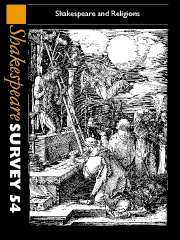Book contents
- Frontmatter
- Shakespeare and the Protestant Mind
- Divine [ ]sences
- ‘An alien people clutching their Gods’?: Shakespeare’s Ancient Religions
- ‘He drew the Liturgy, and framed the rites’: The Changing Role of Religious Disposition in Shakespeare's Reception
- Jonson, Shakespeare, and the Religion of Players
- The Bard and Ireland: Shakespeare’s Protestantism as Politics in Disguise
- ‘Every Good Gift From Above’ Archbishop Trench’s Tercentenary Sermon
- Anthony Munday and The Merchant of Venice
- Perfect Answers: Religious Inquisition, Falstaffian Wit
- When Suicide Becomes an Act of Honour: Julius Caesar and Hamlet in Late Nineteenth-Century Japan
- Religion in Arden
- A Wedding and Four Funerals: Conjunction and Commemoration in Hamlet
- Between Religion and Ideology: Some Russian Hamlets of the Twentieth Century
- Of Shadows and Stones: Revering and Translating ‘the Word’ Shakespeare in Mexico
- Ministers, Magistrates and the Production of ‘Order’ in Measure for Measure
- The Hebrew Who Turned Christian: The First Translator of Shakespeare into the Holy Tongue
- Shakespeare and English Performance Style: The European Context
- All At Sea: Water, Syntax, and Character Dissolution in Shakespeare
- King John, König Johann: War and Peace
- The Tempest’s Forgotten Exile
- The Old Lady, or All is Not True
- Shakespeare Performances in England, 2000
- Professional Shakespeare Productions in the British Isles January-December 1999
- The Year's Contributions to Shakespearian Study 1 Critical Studies
- 2 Shakespeare’s Life, Times, and Stage
- 3 Editions and Textual Studies
- Books Received
- Index
Divine [ ]sences
Published online by Cambridge University Press: 28 March 2007
- Frontmatter
- Shakespeare and the Protestant Mind
- Divine [ ]sences
- ‘An alien people clutching their Gods’?: Shakespeare’s Ancient Religions
- ‘He drew the Liturgy, and framed the rites’: The Changing Role of Religious Disposition in Shakespeare's Reception
- Jonson, Shakespeare, and the Religion of Players
- The Bard and Ireland: Shakespeare’s Protestantism as Politics in Disguise
- ‘Every Good Gift From Above’ Archbishop Trench’s Tercentenary Sermon
- Anthony Munday and The Merchant of Venice
- Perfect Answers: Religious Inquisition, Falstaffian Wit
- When Suicide Becomes an Act of Honour: Julius Caesar and Hamlet in Late Nineteenth-Century Japan
- Religion in Arden
- A Wedding and Four Funerals: Conjunction and Commemoration in Hamlet
- Between Religion and Ideology: Some Russian Hamlets of the Twentieth Century
- Of Shadows and Stones: Revering and Translating ‘the Word’ Shakespeare in Mexico
- Ministers, Magistrates and the Production of ‘Order’ in Measure for Measure
- The Hebrew Who Turned Christian: The First Translator of Shakespeare into the Holy Tongue
- Shakespeare and English Performance Style: The European Context
- All At Sea: Water, Syntax, and Character Dissolution in Shakespeare
- King John, König Johann: War and Peace
- The Tempest’s Forgotten Exile
- The Old Lady, or All is Not True
- Shakespeare Performances in England, 2000
- Professional Shakespeare Productions in the British Isles January-December 1999
- The Year's Contributions to Shakespearian Study 1 Critical Studies
- 2 Shakespeare’s Life, Times, and Stage
- 3 Editions and Textual Studies
- Books Received
- Index
Summary
‘I am not here.’
Thomas MiddletonHow shall we represent God?
This question has preoccupied humanity far more often, and with far more consequence, than the question 'Does God exist?' Because 'How shall we represent God?' entails the question 'Who shall be God's representative?', and that question is as much political as theological; how you answered it in early modern Europe determined not only whether you were Catholic or Protestant, but also what kind of Protestant you were (presbyterian or episcopal) - and which governments you would obey. 'How shall we represent God?' also entails 'Where shall we represent God?' and 'By what means shall we represent God?' The Reformation reformed divine representation: the personnel, texts, actions and artifacts, by which medieval Christianity had represented the divine. Protestant iconoclasts physically attacked the rood, the paintings, carvings, statues, stained-glass windows which had filled (or cluttered) medieval churches; they ended the ritual re-enactments of medieval biblical drama, and banned God, in both body and name, from the public stage. God is truth, the theatre is falsehood, falsehood cannot represent truth, the theatre cannot represent God.
They banned God, but they did not ban gods. It is no violation of decorum for a false god to be represented by lies and disguises. Indeed, 'The Devil', Stephen Gosson declared, reiterating centuries of Christian diatribes, 'is the efficient cause of plays.'
- Type
- Chapter
- Information
- Shakespeare Survey , pp. 13 - 30Publisher: Cambridge University PressPrint publication year: 2001
- 5
- Cited by

